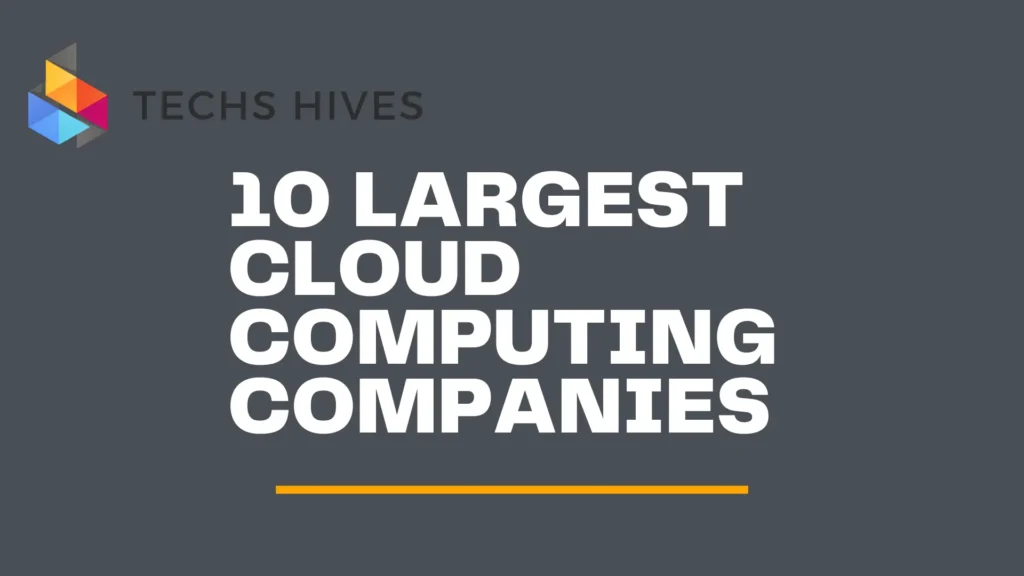Cloud computing allows users to access and store data over the internet instead of on local computers. It provides services like storage, processing power, and software applications online. This means you can use your files and programs from anywhere, as long as you have internet access. Cloud computing is flexible and cost-effective, allowing businesses to pay for only what they use.
They manage the infrastructure and services needed for cloud computing. This ensures that users can access their data safely and reliably. Major cloud providers offer advanced features, including data security, backups, and scalability. This support helps businesses grow without worrying about technical challenges.
Table of Contents
Criteria for Ranking
When evaluating the largest cloud computing companies, several key criteria are essential for accurate ranking.
- Market Share: Market share measures the percentage of the overall cloud market that a company controls. A higher market share indicates a stronger presence and influence in the industry. Leading companies typically dominate this space, reflecting their ability to attract and retain customers over time.
- Revenue: Total income generated from cloud services is a crucial indicator of a company’s success. Higher revenue suggests that a company is attracting more customers and generating significant business from its offerings. This financial health allows providers to invest in new technologies and enhance their services.
- Service Offerings: The range and quality of services provided are important. Companies with a diverse set of offerings, such as infrastructure as a service (IaaS), platform as a service (PaaS), and software as a service (SaaS), tend to attract more clients. Comprehensive service portfolios cater to varying customer needs, increasing their market appeal.
- Customer Base: The number and variety of customers served by a cloud provider reflect its reputation and reliability. A broad customer base can indicate trust and stability, as clients from various industries rely on the provider for their cloud needs. Diverse clientele often leads to more valuable feedback and improvement opportunities.
- Innovation and Technology: Companies that invest in new technologies and innovative solutions often lead the market. Their ability to adapt to changing trends and customer needs is vital for long-term success. Innovation in areas like artificial intelligence, machine learning, and edge computing can set a provider apart from competitors.
- Performance and Reliability: Performance metrics, such as uptime and speed, are essential for customer satisfaction. Reliable providers build strong relationships with their clients through consistent service. High-performance cloud solutions can enhance user experience and ensure critical business operations run smoothly.
5 Top Cloud Computing Companies
This section highlights the leading cloud computing companies, focusing on their strengths, service offerings, and market position.
1. Amazon Web Services (AWS)
AWS is the largest cloud service provider, known for its extensive range of services and global reach. It offers computing power, storage solutions, machine learning, and database services. With a significant market share, AWS serves millions of customers, including startups and enterprises, making it a dominant force in the cloud space.
2. Microsoft Azure
Azure is Microsoft’s cloud computing platform, known for its strong integration with Microsoft products. It provides services like virtual machines, app services, and AI solutions. Azure is one of the fastest-growing cloud platforms, appealing to businesses looking for hybrid cloud solutions.
3. Google Cloud Platform (GCP)
GCP is recognized for its data analytics and machine learning capabilities, leveraging Google’s advanced technology. It offers services such as data storage, compute engine, and BigQuery for analytics. GCP is gaining traction among businesses focusing on innovation and data-driven solutions.
4. IBM Cloud
IBM Cloud combines platform as a service (PaaS) and infrastructure as a service (IaaS) to support various workloads. It provides services like blockchain, AI, and Kubernetes. IBM Cloud targets enterprises with complex needs, leveraging its long-standing reputation in technology.
5. Alibaba Cloud
Alibaba Cloud is the leading cloud provider in Asia, known for its scalable and flexible solutions. It offers a range of services, including data storage, analytics, and machine learning. Alibaba Cloud is expanding globally, providing competitive services to meet the needs of businesses worldwide.
5 Emerging Players in the Cloud Market
Several emerging players are making significant strides in the cloud computing landscape.
1. Oracle Cloud
Oracle Cloud is gaining traction by focusing on enterprise solutions and database services. Known for its strong database management systems, Oracle offers a robust cloud platform that includes applications for enterprise resource planning (ERP) and customer relationship management (CRM). Oracle Cloud’s emphasis on security, performance, and integration with existing enterprise systems makes it an attractive option for businesses looking to migrate to the cloud without compromising their operations.
2. Salesforce
Salesforce has established itself as a leader in customer relationship management (CRM) and has expanded its cloud services beyond CRM into areas like analytics, artificial intelligence, and application development. The Salesforce Cloud provides tools for marketing, sales, and service, enabling businesses to engage customers effectively. Its platform allows for easy customization and integration with various applications, making it a popular choice for companies aiming to enhance their customer engagement strategies.
3. DigitalOcean
DigitalOcean targets developers and small to medium-sized businesses with its user-friendly platform and straightforward pricing model. Known for its simplicity, DigitalOcean provides cloud infrastructure services that include scalable compute instances, managed databases, and container orchestration. Its focus on developer experience and ease of use has attracted a loyal customer base, especially among startups and tech-savvy businesses looking for cost-effective cloud solutions.
4. Vultr
Vultr is gaining attention for its focus on high-performance cloud infrastructure and competitive pricing. It offers a variety of cloud services, including compute instances, block storage, and bare metal servers. With a global presence and a commitment to providing high-speed, reliable services, Vultr appeals to developers and businesses seeking flexible and affordable cloud solutions for their applications.
5. Linode
Linode has positioned itself as a reliable cloud provider for developers, offering simple and affordable cloud services. It provides virtual private servers, Kubernetes hosting, and various networking solutions. Linode’s commitment to transparency and customer support has helped it build a loyal user base, particularly among developers and small businesses looking for a straightforward cloud experience.
FAQs
1. What is cloud computing?
Cloud computing is the delivery of computing services over the internet. It allows users to access data and applications without needing physical servers or local storage.
2. How do cloud companies ensure data security?
Cloud companies use various security measures, such as encryption, firewalls, and regular security audits. They also provide user authentication to protect data from unauthorized access.
3. What are the different types of cloud services?
There are three main types of cloud services: Infrastructure as a Service (IaaS), Platform as a Service (PaaS), and Software as a Service (SaaS). Each serves different business needs and levels of control.
4. How does cloud computing benefit businesses?
Cloud computing offers flexibility, cost savings, and scalability. Businesses can easily scale their resources up or down based on demand, helping them manage costs effectively.
5. Are there any downsides to using cloud services?
Yes, some downsides include potential downtime, data privacy concerns, and dependency on internet connectivity. Companies must weigh these factors against the benefits when choosing cloud services.
Conclusion
The cloud computing industry is dominated by several major players, each offering unique services and strengths. Companies like AWS, Microsoft Azure, and Google Cloud are at the forefront, providing a wide range of solutions to meet diverse business needs. Their ability to innovate and adapt keeps them competitive in a rapidly changing market.
Emerging players like Oracle Cloud, Salesforce, DigitalOcean, Vultr, and Linode are also making their mark. They cater to specific markets and offer tailored solutions that appeal to businesses of all sizes. As more companies move to the cloud, the landscape will continue to evolve. Understanding the strengths and offerings of these providers is essential for businesses looking to leverage cloud technology effectively.



